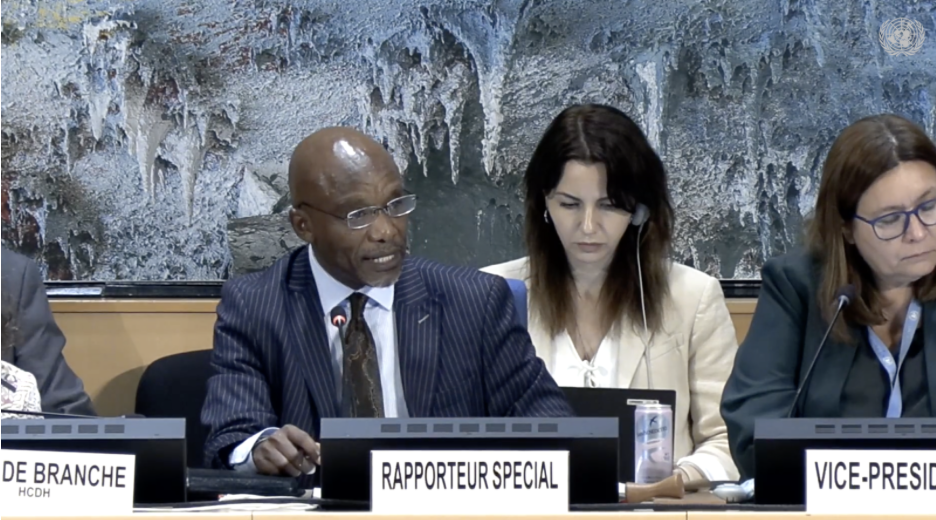
The Vital Need to Protect Indigenous Peoples’ Rights Worldwide
The 60th Session of the Human Rights Council
08 September – 08 October 2025
Item 3&5: Interactive Dialogue with Special Rapporteur on rights of Indigenous Peoples
23 September 2025
By Andrea Pantazi / GICJ
Executive summary
The 60th session of the Human Rights Council focused on the urgent need to protect the rights of Indigenous Peoples worldwide. This discussion comes as the international community approaches the 20th anniversary of the UN Declaration on the Rights of Indigenous Peoples (UNDRIP). While the Declaration has inspired progress in some regions, many States still fall short in providing legal recognition and meaningful protection for Indigenous communities.
The Special Rapporteur, Dr. Albert K. Barume, underlined that recognition of Indigenous Peoples is not optional but a legal obligation under international law. He stressed that Indigenous rights are inherent and not created by recognition, and warned against the growing practice of merging the category of Indigenous Peoples with “local communities” in environmental and biodiversity discussions, as this undermines their distinct rights. He also highlighted that self-identification, redress for historical injustices, and cultural distinctiveness must guide recognition.
Country and group statements reflected both progress and challenges. States such as Canada, Guatemala, and Ecuador reaffirmed their commitments to recognition and protection, while others, including Ukraine and the EU, raised concerns about violations in specific contexts such as Crimea. Civil society and NGOs echoed the call for stronger action, pointing to ongoing human rights abuses, violence, and systemic discrimination faced by Indigenous Peoples worldwide.
In his concluding remarks, the Special Rapporteur reaffirmed that recognition is fundamental to justice and inclusivity, and that fears about the political implications of recognition must be overcome. He committed to further regional engagement to address States’ concerns.
Geneva International Centre for Justice (GICJ) welcomes the report and reiterates its concern over the discrimination Indigenous Peoples face worldwide. Genuine recognition is essential for justice, inclusivity, and lasting peace.
Background
The 60th session of the Human Rights Council considered the issue of the recognition of Indigenous Peoples. The UNDRIP has become a global framework for the promotion and protection of Indigenous Peoples’ rights, establishing minimum standards for dignity, survival, and well-being. Since its adoption, many States have advanced legal recognition of Indigenous Peoples, particularly in Latin America, parts of Asia, and the Nordic region. However, challenges remain, especially in Africa and Asia, where some States continue to resist recognition, often misunderstanding the term “Indigenous Peoples” as divisive or privileging certain groups.
Indigenous Peoples worldwide continue to face discrimination, dispossession of ancestral lands, and threats to cultural survival. They remain disproportionately affected by poverty, violence, and marginalisation. In addition, the growing practice of conflating “Indigenous Peoples” with “local communities” in environmental and biodiversity discussions has generated confusion and risks undermining the distinct rights of Indigenous Peoples under international human rights law. The recognition of Indigenous Peoples is therefore not only a matter of legal formality but also of ensuring justice, redress for historical wrongs, and meaningful participation in decision-making at national and international levels.
Summary of the Special Rapporteur’s Report
The Special Rapporteur (SP), Dr Albert K. Barume, presented a thematic analysis on the recognition of Indigenous Peoples under his mandate (A/HRC/60/29). The report emphasised that recognition is an obligation. States are obligated to recognise Indigenous Peoples as distinct rights holders under international law. Recognition does not create Indigenous Peoples or their rights, as they are inherent and binding under instruments such as the International Covenant on Civil and Political Rights (ICCPR), the International Covenant on Economic, Social and Cultural Rights (ICESCR), the International Covenant on the Elimination of all forms of Racial Discrimination (ICERD), the Convention on the Elimination of All Forms of Discirmination Against Women (CEDAW), the Convention on the Rights of the Child (CRC), International Labour Organisation (ILO) Convention No. 169, and UNDRIP.
Moreover, the Special Rapporteur defined the term “Indigenous Peoples”. The report clarified that the term is a human rights concept linked to redress for historical injustices, not merely an anthropological notion of “first inhabitants”. It highlighted regional understandings: in Africa, Indigenous status relates to communities marginalised for their livelihoods (e.g., pastoralists, hunter-gatherers), while in Asia it often refers to tribal or minority groups facing exclusion and land dispossession. A key concern is the increasing use of “Indigenous Peoples and local communities (IPLCs)” in multilateral environmental frameworks. The Special Rapporteur warned that this conflation dilutes Indigenous Peoples’ stronger rights under international law and risks undermining protections, amounting to a form of retrogression. He called for the two categories to remain distinct.
The report also stressed that self-identification is a fundamental principle for recognition, combined with historical injustices and cultural distinctiveness. States must not deny peoples’ identity or use recognition processes to assimilate or erase them.
The report surveyed constitutional, legislative, and policy recognition across regions. Latin America and parts of Europe have advanced constitutional recognition; the Philippines, Japan, Canada, and Nordic States provide notable legal frameworks; while in Africa and Asia, progress remains slow. Recognition is often symbolic without effective enforcement.
Several conclusions and recommendations were made by the Special Rapporteur in light of these facts, such as that States must legally recognise Indigenous Peoples as rights holders, ensure their self-determination, and support their representative institutions. He also stated that recognition should include the incorporation of UNDRIP into domestic law, compliance with judicial rulings, and guarantees of free, prior and informed consent (FPIC). The UN system should also ensure that Indigenous Peoples’ participation mechanisms reflect their distinct status and rights.
Interactive Dialogue with the Special Rapporteur on the rights of Indigenous Peoples
Opening Statement of the Special Rapporteur

In his first thematic report, Dr Albert K. Barume, the SP on the rights of Indigenous Peoples, focused on the global challenges facing Indigenous communities and the need for stronger recognition of their rights. He recalled the 18th anniversary of the UN Declaration on the Rights of Indigenous Peoples, which sets a minimum standard for the protection of Indigenous rights and has inspired new laws, policies, and partnerships built on trust and mutual respect. While progress has been made in many countries, the impact of the Declaration has not been uniform. In several regions, especially in Africa and Asia, States still struggle to understand the concept of Indigenous Peoples and their rights, often fearing that recognition may divide their populations or give special privileges to certain groups. The Rapporteur described these as misconceptions that prevent States from fulfilling their international obligations.
He explained that Indigenous Peoples cannot be understood solely as minorities, local communities, or poor populations. Instead, they are groups that have suffered unique historical injustices, such as dispossession of ancestral lands, cultural erasure, and severe discrimination. These continue to cause intergenerational trauma. Recognition must therefore start with three key steps: first, acknowledging the particular injustices experienced by communities that self-identify as Indigenous; second, understanding that the term “Indigenous Peoples” in the UN Declaration is a human rights concept, not just a literal or historical definition; and third, aligning national laws and policies with international standards.
Dr Barume concluded by reaffirming that recognition is not optional, but a matter of justice and a crucial step toward building inclusive and cohesive societies. He urged States and stakeholders to implement his recommendations and highlighted Botswana as a positive example, acknowledging its recent steps toward recognition and calling on the international community to continue supporting its progress.
Country and Groups Statements
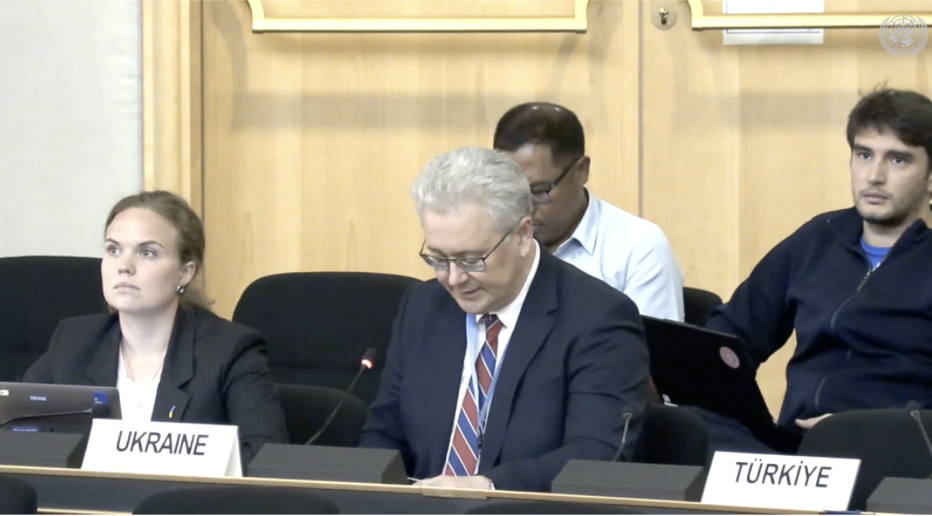
The delegate of Ukraine, speaking on behalf of a group of countries (including Lithuania and Poland), first presented his statement, saying that recognition of the indigenous peoples’ rights is crucial. The refusal to do so weakens the ability of States to fulfil their international obligations. In Crimea, there is an ongoing occupation by Russia, which threatens the community life and survival of the Tartars. Moreover, the prohibition of Ukrainian language education by Russia is incredibly harmful. The international community needs to remain steadfast in promoting indigenous peoples’ rights, and he called for accountability for what is happening in Ukraine today.
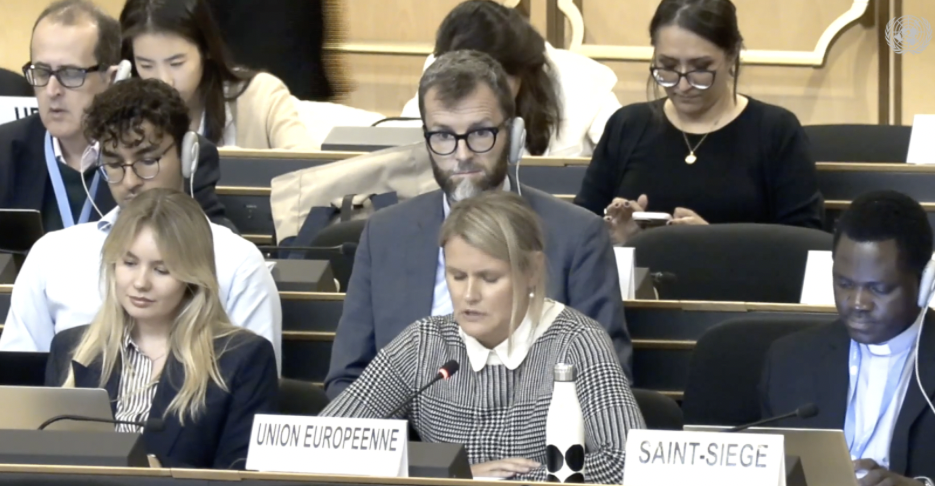
The delegate representing the EU began their statement by thanking the SP for his report. She stressed the EU will continue promoting the rights of indigenous peoples as set out in the UNDRIP and international human rights law. The work of the SP is critical, and the EU fully supports the renewal of his mandate. She stated that States need to close the gap in recognition of indigenous peoples’ rights, and called for more meaningful participation of indigenous people in the HRC Sessions, noting challenges such as accreditation and language barriers. Indigenous peoples have the right to shape the policies which affect them, and engagement mechanisms should affect the rights of indigenous peoples. She concluded by asking the SP how this can be best done.
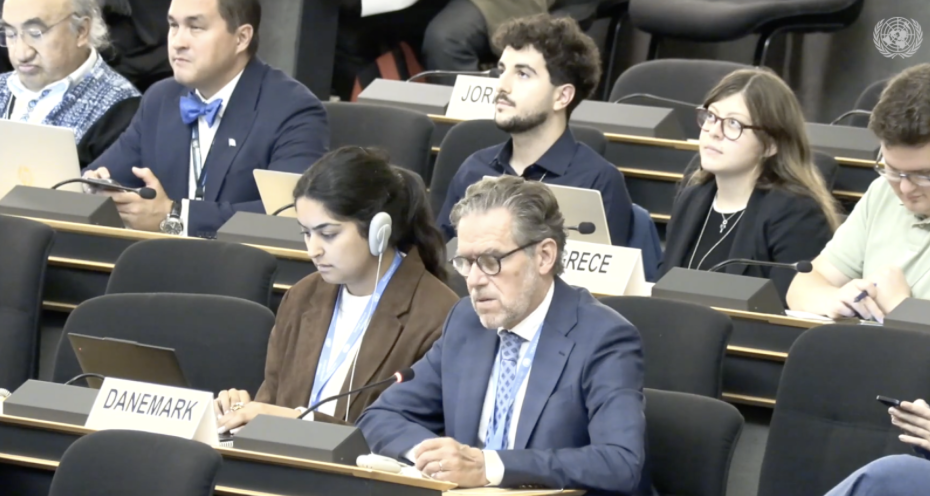
The delegate of Denmark, who spoke on behalf of the Nordic Baltic States, opened their statement by welcoming the SP’s report. He stated that it is vital for addressing historical injustices, and noted how frequent conflations with indigenous peoples with other groups is harmful to their rights. He concluded by asking the SP how States can improve clarity to help uphold the distinct rights of indigenous peoples.
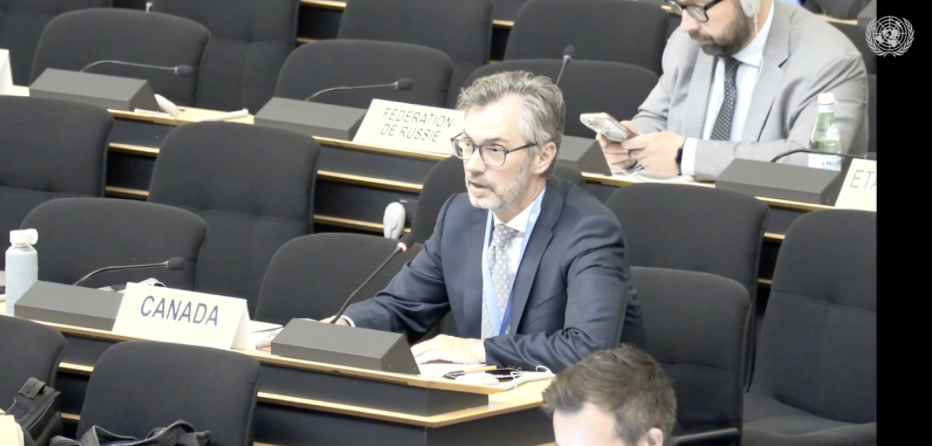
The representative of Canada supported the SP’s recommendation for a legal pathway for self-determination, and echoed the concerns of conflating the term ‘indigenous peoples’ with other terms such as ‘local communities’, stating that this undermines their human rights. Canada recognized their own colonial past, which impacts indigenous peoples today, and called on all States to affirm the UNDRIP.
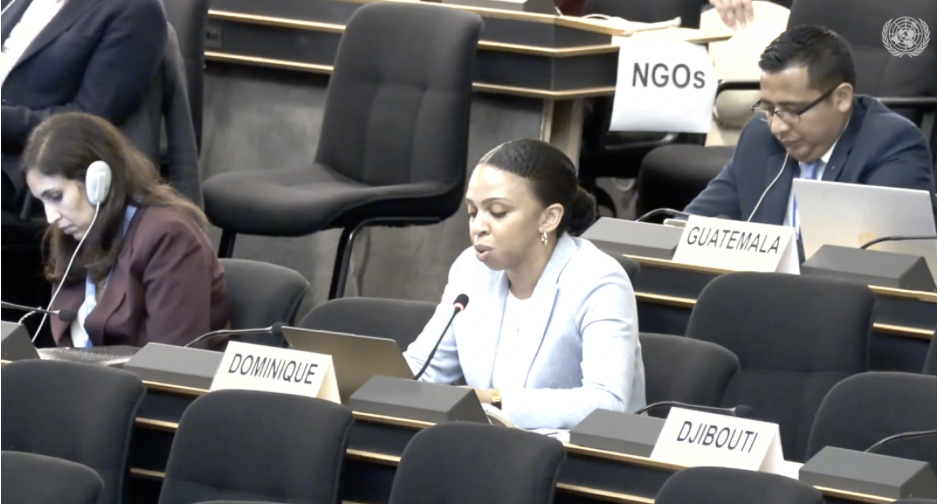
The representative of Dominica welcomed the SP’s report and stated that indigenous peoples are specific rights holders. As the home of the last remaining Kalinago people in the Caribbean, Dominica is passionate about upholding their rights, as shown by the domestic policies and laws. She supported the SP’ recommendations, as well as the rights of indigenous peoples. In doing so, she reminded the Council of the potential to advance climate resilience with the knowledge of the Kalinago people, stressing it is essential in achieving sustainable outcomes.
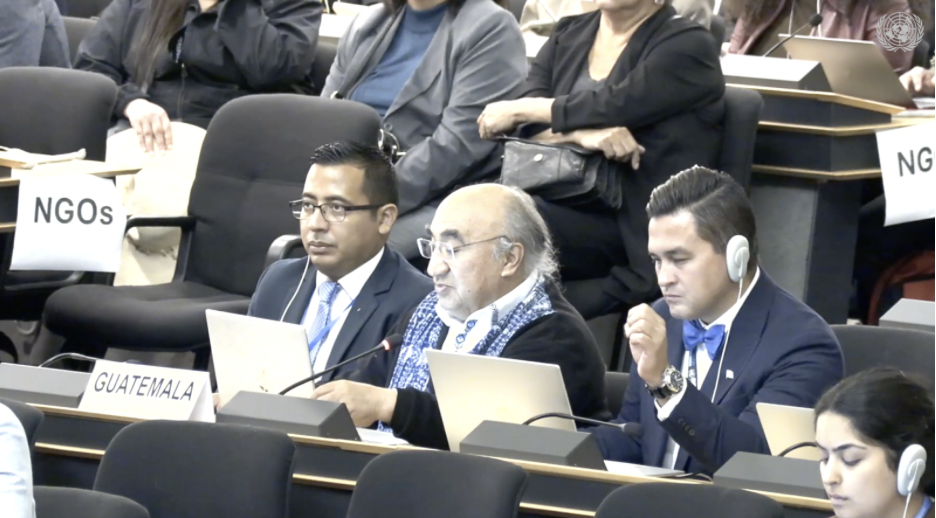
The delegate of Guatemala stated their gratitude to the SP for presenting his report, and welcomed his clear approach to addressing the persisting challenges in this field. During this session of the Human Rights Council, he facilitated a draft resolution with Mexico. He emphasised that this mandateis a cornerstone for accountability, as it helps states to comply with their international obligations. This is required for the emerging challenges indigenous peoples face. Guatemala highlighted the importance of differentiating ‘indigenous peoples’ with ‘local communities’, and stated that at the national level, Guatemala listens to its indigenous communities when creating new policies.
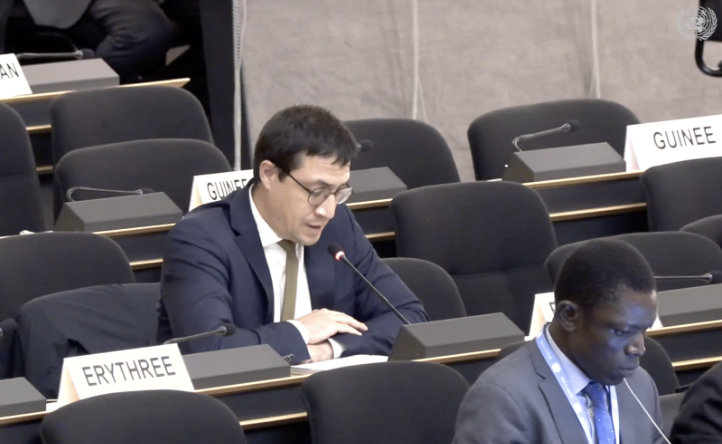
The representative of Ecuador welcomed the SP's report and stated that they have taken important steps toward the recognition and participation of indigenous peoples in their government. Ecuador has ensured the constitutional formalisation of the existence of indigenous nationalities in people, and recognised its plurinational intercultural state. Its Secretariat is tasked with promoting policies with an intercultural approach. Moreover, the Ecuadorian ‘Red +’ program supports forest conservation projects led by indigenous peoples.
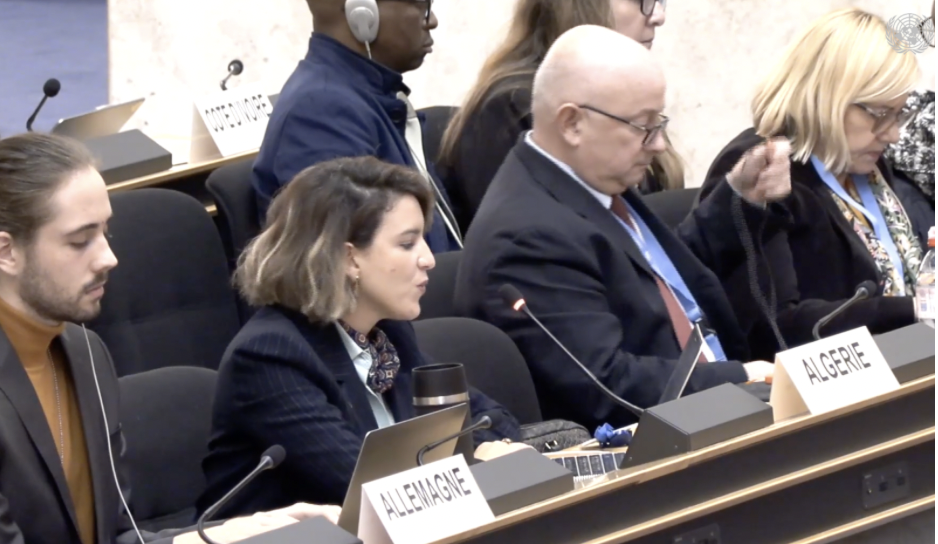
The representative of Algeria stated that the country is marked by a historical cycle of colonisation, decolonisation, and recolonisation over more than 2000 years. Since their independence in 1962, they have restored the full status of citizenship for all of its inhabitants, which was limited by the French beforehand. She stated that diversity helps Algeria’s social cohesion. However, she underlined challenges related to globalisation. Algeria gave their full support for the SP’s mandate, and commended his openness to dialogue
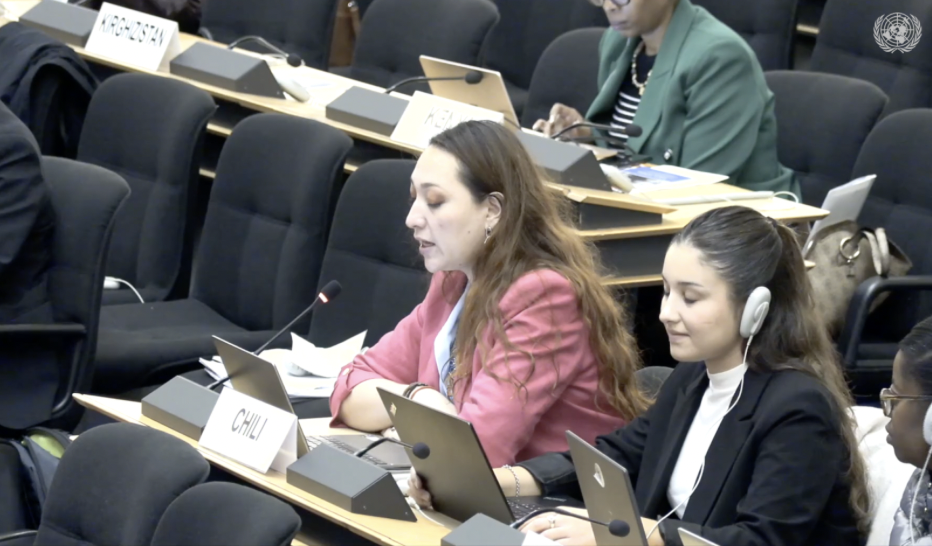
The representative of Chile welcomed the SP’s report and stated that in Chile, there is specific legislation on protecting the rights of indigenous peoples, as well as a Constitutional recommendation which has been pending for a number of decades. However, recent events have given them hope for change. They hope to have the support of the international community so that the recognition of the rights of indigenous peoples will be adopted into the Chilean Constitution, acting independently from the government in power.
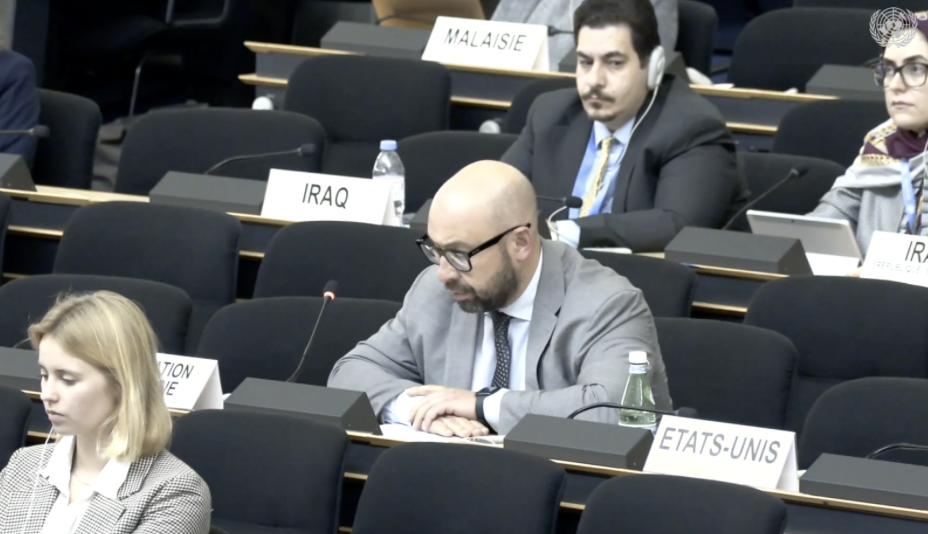
The delegate of the Russian Federation claimed that, although the SP has presented a balanced report, it has made sweeping accusations against all states for violating the rights of indigenous peoples. He stated that Russia has had centuries of experience with recognising the rights of indigenous peoples, and the guarantees of indigenous peoples’ rights are enshrined in its Constitution. He reminded the Council that today’s policymakers in Russia are guided by the need to ensure the sustainable development of indigenous peoples, and also the need to strengthen their socio-economic capacity, while also aiming to ensure their cultural practices and freedoms.
Statements by NGOs and Civil Society
In the statements delivered by NGOs, many thanked the SR for their important report, and called on more tangible action to be made worldwide to ensure the human rights of indigenous peoples. They stated that the UNDRIP provides a necessary framework, and called for nations to implement the declaration into their national legal frameworks. Indigenous peoples face human rights violations; for example, there are many in prison systems worldwide, a problem that is only worsening. Moreover, targets towards healthy birth rates, higher education, housing and life expectancy are not expected to be met in some countries. There are many murders of indigenous peoples, including children, and there are other ongoing atrocities reported to have happened as recently as this week. Some NGOs called for a holistic approach to recognise and implement the rights of indigenous peoples.
Concluding Remarks
In the SP’s concluding remarks, he had three main points. First, he sincerely thanked the UN Member States for their questions, as well as for reading his report. Secondly, he wanted to thank the speakers for appreciating and understanding what he tried to do in this report. He states that he was not writing necessarily for experts in international law, but wanted to represent a shift in the understanding of indigenous peoples. He addressed the fears that states continue to have about the political connotations of ‘indigenous peoples’. Since the adoption of the UNDRIP, the rights of indigenous peoples have become a tool for states to have more cohesive nations and policies. He noted that colonisation was the main factor of violations in the past, but there are other factors today that affect indigenous rights as well. Lastly, he stated that he will be taking regional webinars to respond to the questions he could not respond to in his short time allotted at the Session, and thanked those for attending the ID.
Position of Geneva International Centre for Justice (GICJ)
Geneva International Centre for Justice (GICJ) strongly supports the findings of the Special Rapporteur. The recognition of indigenous peoples is not optional, but an international obligation. States must urgently align their laws with UNDRIP, ensure redress for past injustices, and guarantee full participation of indigenous communities in shaping their futures. Only through genuine recognition can nations achieve justice, inclusivity, and lasting peace.
Keywords
Indigenous People, Human Rights, Self-determination, UNDRIP, Human Rights Council




